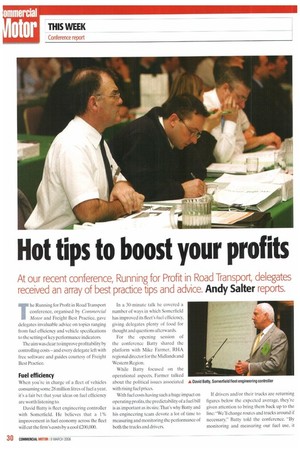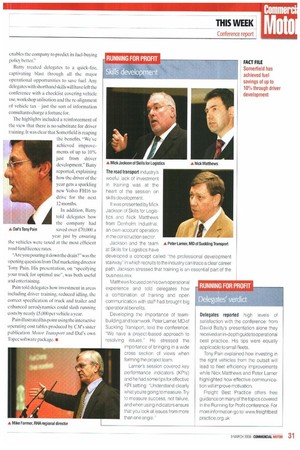Hot tips to boost your profits
Page 30

Page 31

If you've noticed an error in this article please click here to report it so we can fix it.
At our recent conference, Running for Profit in Road Transport, delegates received an array of best practice tips and advice. Andy Salter reports.
The Running for Profit in Road Transport conference, organised by Commercial Motor and Freight Best Practice, gave delegates invaluable advice on topics ranging from fuel efficiency and vehicle specifications to the setting of key performance indicators.
The aim was clear: to improve profitability by controlling costs—and every delegate left with free software and guides courtesy of Freight Best Practice.
Fuel efficiency When you're in charge of a fleet of vehicles consuming some 28 million litres of fuel a year, it's a fair bet that your ideas on fuel efficiency are worth listening to.
David Batty is fleet engineering controller with Somerfield. He believes that a 1% improvement in fuel economy across the fleet will cut the firm's costs by a cool £200,000. In a 30-minute talk he covered a number of ways in which Somerfield has improved its fleet's fuel efficiency, giving delegates plenty of food for thought and questions afterwards.
For the opening session of the conference Batty shared the platform with Mike Farmer, RHA regional director for the Midlands and Western Region.
While Batty focused on the operational aspects, Farmer talked about the political issues associated with rising fuel prices.
With fuel costs having such a huge impact on operating profits. the predictability of a fuel bill is as important as its size. That's why Batty and his engineering team devote a lot of time to measuring and monitoring the performance of both the trucks and drivers. If drivers and/or their trucks are returning figures below the expected average, they're given attention to bring them back up to the line: "We'll change routes and trucks around if necessary," Batty told the conference. "By monitoring and measuring our fuel use, it enables the company to predict its fuel-buying policy better."
Batty treated delegates to a quick-fire, captivating blast through all the major operational opportunities to save fuel. Any delegates with shorthand skills will have left the conference with a checklist covering vehicle use, workshop utilisation and the re-alignment of vehicle tax just the sort of information consultants charge a fortune for.
The highlights included a reinforcement of the view that there is no substitute for driver training. It was clear that Somerfield is reaping the benefits. "We've achieved improvements of up to 10% just from driver development," Batty reported, explaining how the driver of the year gets a sparkling new Volvo FH16 to drive for the next 12 months.
AIn addition, Batty told delegates how the company had saved OVCT 00.000 a A Oaf's Tony Pain year just by ensuring the vehicles were taxed at the most efficient road fund licence rates.
"Are you pouring it down the drain?" was the opening question from Daf marketing director Tony Pain. His presentation, on "specifying your truck for optimal use", was both useful and entertaining.
Pain told delegates how investment in areas including driver training, reduced idling, the correct specification of truck and trailer and enhanced aerodynamics could slash running costs by nearly £5,000 per vehicle a year.
Pain illustrated his point using the interactive operating cost tables produced by CM's sister publication Motor Transport and Daf's own Topec software package. • The road transport industry's woeful lack of investment in training was at the heart of the session on skills development.
It was presented by Mick Jackson of Skills for Logistics and Nick Matthews from Denholm Industrial, an own-account operation in the construction sector.
Jackson and the team at Skills for Logistics have developed a concept called the professional development stairway" in which recruits to the industry can trace a clear career path. Jackson stressed that training is an essential part of the business mix.
Matthews focused on his own operational experience and told delegates how a combination of training and open communication with staff had brought big operational benefits.
Developing the importance of teambuilding and teamwork, Peter Lamer, MD of Suckling Transport, told the conference: "We have a project-based approach to resolving issues." He stressed the importance of bringing in a wide cross section of views when forming the project team.
Lamer's session covered key performance indicators (KPis) and he had some tips for effective KPI setting: "Understand clearly what you're going to measure. Try to measure success, not failure, and when using indicators ensure that you look at issues from more than one angle."
































































































































































































